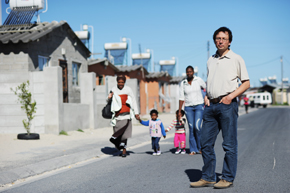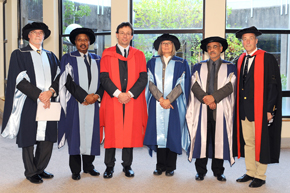Plan for climate change, says New
23 April 2012Even if he covered nothing new in his talk, it was the way in which the themes were strung together that made you sit up and take notice.
 |
 |
| Prof Mark New in Kuyasa, Khayelitsha, where thousands of low-cost homes have been fitted with solar-water heaters, insulated ceilings and energy-efficient lighting - the kind of initiatives that are going to be essential if South Africa is to follow a climate-compatible development pathway. | Gearing up: Prof Mark New (in red gown) with deputy vice-chancellors Prof Danie Visser, Prof Thandabantu Nhlapo, Prof Sandra Klopper and Prof Crain Soudien, and Prof Michael Meadows, head of the Department of Environmental and Geographical Science. |
But pulling themes and projects together just about sums up the job description for Professor Mark New, UCT pro vice-chancellor for climate change and director of the African Climate and Development Initiative (ACDI). So New's inaugural lecture, titled Squaring the Circle: Climate change, development, sustainability, delivered to an overflowing lecture theatre on 11 April, covered a lot of ground.
In his introduction, New noted, fittingly, that it's impossible to understand such a complex social-ecological problem without understanding all its components. And, indeed, bringing them together to form a solution.
It's in this spirit of true interdisciplinarity - the core driver behind the ACDI - that New drew together a cornucopia of research, including his own, to give the audience a broad-brush outline of climate change - the what, the why, and the where to from here.
It's not a pretty picture he painted.
There's no doubt that climate change is caused by humans, New said at the outset.
"We are pushing the earth system outside the conditions humans have experienced during modern human evolution."
To have a 50/50 chance of staying below a 2°C increase in global temperature, the internationally agreed target for avoiding dangerous climate change impacts, society would need to emit (from the year 1870 to 2300) no more than 1 trillion tonnes of carbon. But, said New, humans have "already used up 55% of that cake", ie 557.5 billion tonnes of carbon, and climbing.
"Essentially, two degrees is out of the window. The reality is we should be planning for coping with climate changes larger than two degrees, but at the same time pushing for emissions reductions to get us as close as possible to the two-degree target."
If the carbon emissions "business" continues as usual, temperatures are on track to reach a 4°C to 7°C increase by the end of the century, he continued.
For South Africa, a 2°C increase would mean a 3°C to 3.5°C rise in local warming. With this would come more and greater extreme weather events, such as storms and floods.
What does all this mean? "We will see an exaggeration of existing climatic patterns - what's dry today, will get dryer; what's wet, will get wetter. Globally, rainfall will increase, but distribution will be very uneven."
And what does it mean for global sustainability and human development, especially in Africa?
It's about finding a balance between necessary human development and what the planet can handle, New said.
For economies such as Africa's, which are often agriculture-driven, sit very low on the human development index and are on track for huge spikes in population numbers, change will require a rethink of future development. For one thing, by 2050 many African countries will have to bring in drought- and heat-resistant maize varieties, says New.
But the yields from these crops may be lower. So improved farming practices and more efficient food storage will have to go hand in hand with these new climate-resilient farming objectives to help overcome the shortfall.
Moreover, the increased demand for water will demand improvements in water-resource infrastructure. But how climate change will impact on water availability is still very uncertain.
"We need to think about putting in place plans that allow for robustness or resilience across a range of possible futures, rather than the traditional engineering approach which is finding the optimal solution for the parameters you've been given."
The bottom line, New said, is that Africa has to find another development pathway if it wants to improve economic wellbeing and reduce damage to the environment. And that pathway cannot be based on the path taken by today's high-carbon emitters, and will rather have to call on green technology.
"We have the technology and the tools to do it, but the international political system is in gridlock," cautioned New.
And it was with this parting thought that the audience filed out of the lecture theatre to tsunami alerts, and forecasts of an impending heat wave.
 This work is licensed under a Creative Commons Attribution-NoDerivatives 4.0 International License.
This work is licensed under a Creative Commons Attribution-NoDerivatives 4.0 International License.
Please view the republishing articles page for more information.









